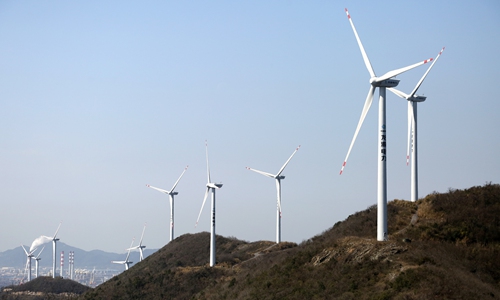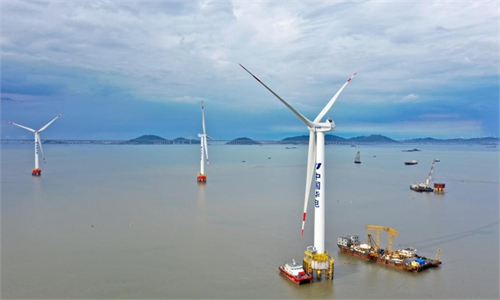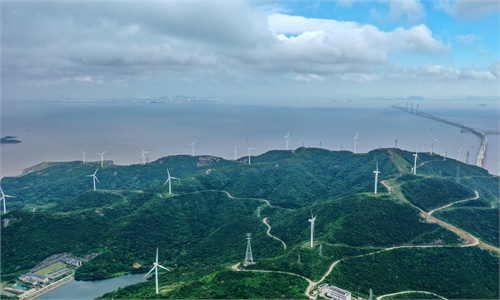EU carbon border tax will hurt trade, jeopardize efforts to fight climate change: Chinese ministry

On Monday, 17 turbines generate electricity at the Jintangfeng wind farm in Zhoushan, East China's Zhejiang Province. In 2019, total of 44.59 million kilowatt hours of electricity were fed into the grid, eliminating about 44,500 tons of carbon emissions in theory. Photo: cnsphoto
Lowering trade tariffs and barriers and promoting liberalization of cross-border trade and investment are important measures to address climate change, and facilitate sustainable development, according to a spokesperson from the Ministry of Ecology and Environment (MEE) on Monday in response to the carbon border tax being considered by the EU.
The EU published a plan in July on levying the world's first carbon border tax to realize a goal of a 55 percent reduction in greenhouse gas emissions in 2030, according to a statement released by the European Commission on July 14.
The carbon border tax, formally referred to as the Carbon Border Adjustment Mechanism, will be phased in from 2026 on industries with high risk of carbon leakage - iron and steel, cement, fertilizer, aluminum and electricity generation.
"Carbon border tax is essentially a kind of unilateral measure. The unprincipled extension of climate issues to trade is not only a violation of WTO rules, a blow to the free and open multilateral trading system, and may cause serious damage to international trust and economic growth, it is also inconsistent with the principles and requirements of the United Nations Framework Convention on Climate Change and its Paris Agreement," said Liu Youbin, spokesperson of the MEE, on Monday during a press briefing.
Resorting to unilateralism and trade protectionism will greatly hurt the enthusiasm and ability of all parties to address global climate change, Liu noted.
The CO2 emissions will reach 33 billion metric tons in 2021, an increase of almost 5 percent or 1.5 billion tons, which should be the second-largest increase in history and the biggest annual rise in emissions since 2010, according to the Global Energy Review 2021 released by the International Energy Agency in April this year
"China always believes that multilateralism is the only way to solve global issues. Facing the challenge of climate change, all countries are actually a community with a shared future. All parties should adhere to multilateralism, the principles of Common but Differentiated Responsibilities and Respective Capabilities and the Nationally Determined Contributions. And, the countries should take action on climate that suit their national conditions through broader global cooperation and jointly tackle climate change," Liu added.



